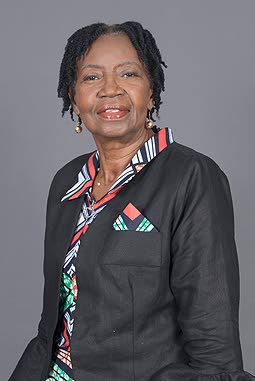Tobago’s endangered linguistic heritage

Dr Rita Pemberton
LANGUAGE represents ways of being, seeing and understanding and provides the basic equipment for handling the essential communication needs of daily living for a community. Language constitutes a central feature of the identity of members of a community.
The critical issue is the ability of a community, regardless of its size, to maintain the life of its language through intergenerational transmission. Language is passed on through parents, grandparents and, for the more fortunate, great-grandparents, which keeps the ancestral links of both the origins of the community and its language.
In addition, oral stories recount the experiences of members of earlier generations which contribute to the collection of oral histories and also reveal the environmental knowledge of the past, while providing guides to humane behaviour that are expressed in the proverbs, poetry, literature, jokes, entertainment, words and acts of wisdom which guide desirable individual behaviours and strengthen communities.
Studies have shown a marked decline of the world’s language diversity as the varieties of language have been pressured out of existence by the growth of empires and the use of language as agency of colonial control. As described by one writer, language was “the companion of empire.”
So what of the language of Tobago?
The Tobago language constitutes a mixture of strong African input with a smattering of English words incorporated into African expressions. It includes the spoken words along with the accompanying body language which emphasised seriousness, firmness, disapproval or approval;the language of drums and conch shells; music and dance. It constitutes a language in its own right, with its own tones and gestures.
The Dutch, Courlander and French influence on the language of Tobago is minimal.
When Tobago was made a British possession in 1763, there was a determined effort to anglicise the island.
While the initial concentration was on the acquisition of an adequate labour force, the spate of rebellions on the island during the 1770s sparked a desire for plantation owners to be able to communicate with their population. Their first resort was to inflict increased brutality to punish the workers for their transgressions of non-compliance with the orders of their masters, but as emancipation approached, the need to enable workers to be able to carry out the orders of their imperial rulers and their agents assumed greater importance.
However, throughout the period of enslavement and the post-emancipation years, Tobago language was effectively used as a weapon of resistance to defy slavemasters/cum employers who sought to be better able to understand the language around them and increase their ability to unravel plots of resistance before they occurred.
In addition, the slaveowner/ employer stood to gain if his charges were made to accept their station in life and obey their masters. This was recognised by planters who gave permission for missionaries to hold classes on their estates. Education was therefore intertwined with Christianity and the English language.
This was the start of a three-pronged attack on the language of Tobago from church and school. Christianity meant exorcism of traditional African practices; education meant learning and communicating in English, which meant abandoning the native tongue.
Hence English was poised to become the dominant language on the island at the expense of the traditional Tobago language, presenting a serious challenge to Tobago’s linguistic heritage.
The process began with the schools, which were established on estates in Tobago West – Riseland, Old Grange, Buccoo, Sherwood Park and Auchenskeoch estates – and the effort of churches to build schools after 1838 through the Negro Education Grant, which saw schools being established across the island except in northern and windward Tobago.
Despite the recognition that the most effective way to teach is using the native language, English, one of the “killer languages,” was the superior language forced on the population at the expense of their native language, which was considered an inferior dialect.
Upward social mobility on the island became identifiable with the ability to speak what was called “the queen’s English,” something hard to attain on an island where the dominant language force came from Scotsmen.
The intertwining of education with social mobility constituted the third prong of the attack on the island’s language.
The education offered to the people of Tobago did not, and still does not, include any aspect of their language. It resulted in marginalising the language and the customs and practices with which it was associated and created an educated class which, in their quest to move up in society, did not identify with the traditions.
Not surprisingly, the traditional Tobago language survived in its strongest form in those parts of the island which were the last to receive formal school structures, and among the working class of the island. By the beginning of the 20th century, working-class Tobagonians were easily identifiable by their language.
Modern developments such as the media, chat groups (which have created a language of their own), tourism and travel have caused further inroads into Tobago’s language.
In addition, the intergenerational structures are not as strong as they used to be.
"Endangered" does not and should not mean the death of the language. There must be a determined effort to correct the omissions of the past and create a curriculum which includes the language of Tobago not as a dialect or inferior language, showing its history, its words and expressions and their roles in the history of the island, demonstrate its value in traditional knowledge preservation, and stimulating creativity so that future generations, regardless of their station in life, can continue to speak the language with pride.

Comments
"Tobago’s endangered linguistic heritage"